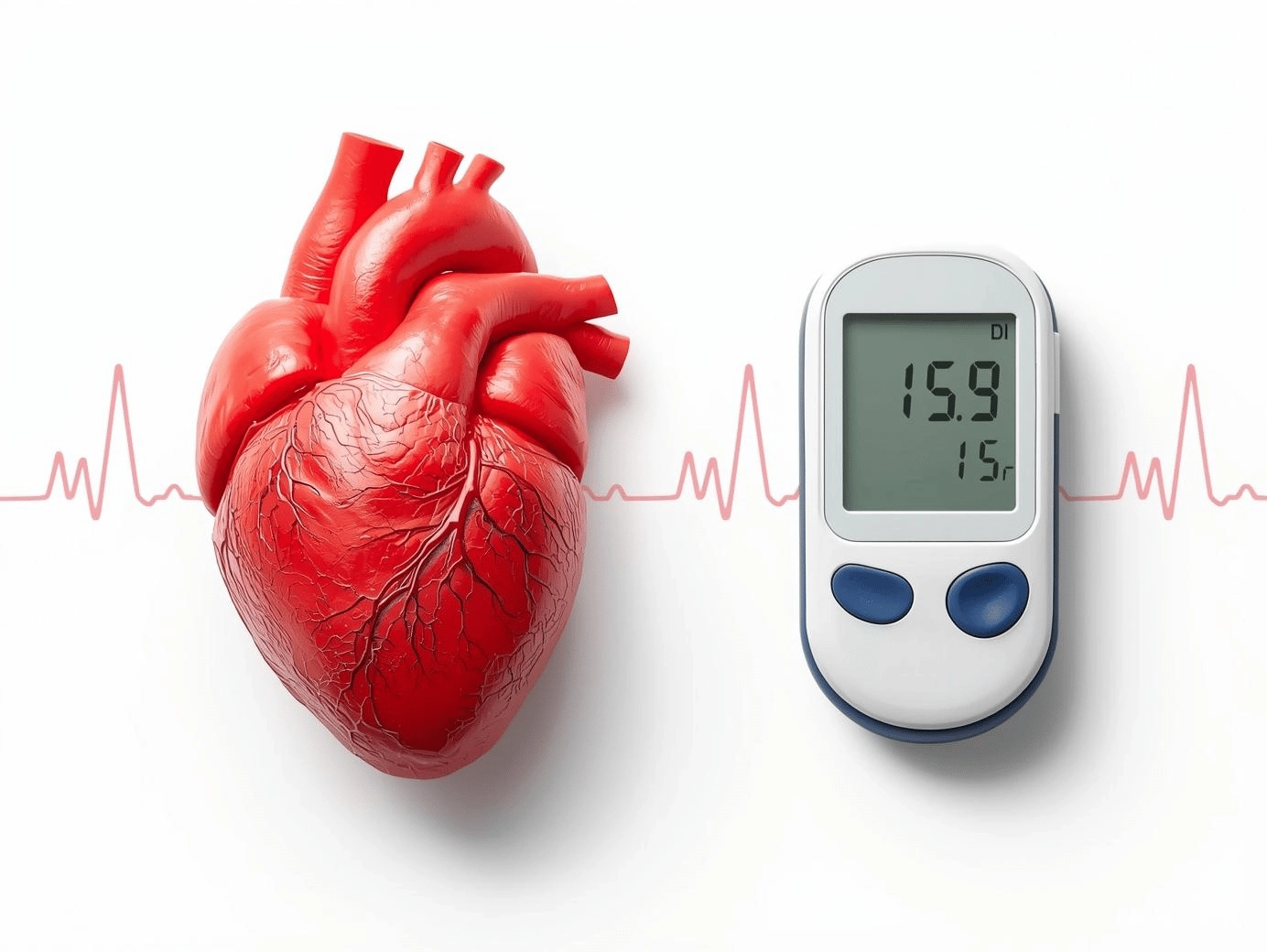Understanding Heart Rate,Tips to Keep It in Check Naturally

Introduction
Diabetes heart disease risk are more connected than most people realize. Studies show that individuals with diabetes are two to four times more likely to develop heart problems. When your sugar levels stay high for too long, it silently damages arteries, increases cholesterol, and weakens the heart muscle, increasing the diabetes heart disease risk.
At VHospitals, our specialists emphasize that managing your blood sugar properly not only keeps diabetes under control but also reduces cardiovascular risk dramatically. Through early diagnosis, lifestyle changes, routine screenings, and personalized heart care programs, patients can achieve better outcomes, improve quality of life, and prevent long-term diabetic heart complications.
Understanding the Strong Connection Between Diabetes and Heart Disease
When your blood glucose remains high, it damages artery walls, allowing cholesterol to build up a process called atherosclerosis. This buildup narrows arteries, raising your risk of coronary artery disease, heart attack, and stroke. Even people with prediabetes have a higher chance of developing cardiovascular complications if sugar isn’t controlled early.
If you notice any discomfort like chest pain, shortness of breath, or unusual fatigue, consult our Cardiology Department at V Hospitals immediately for preventive heart screening and expert care. Also, you can read our detailed health guide on the Early Warning Signs of Heart Attack to stay alert and informed.
How High Blood Sugar Levels Damage Your Heart
Persistent high blood sugar causes inflammation and oxidative stress, which harm both your arteries and heart tissues. Over time, this can lead to:
- Blood vessel damage reducing flexibility
- Nerve damage that disrupts blood pressure control
- Cholesterol imbalance, leading to plaque buildup
These effects collectively increase your risk of diabetes cardiac complications, including heart failure and stroke.
The Advanced Cardiac Treatment Center at VHospitals provides specialized procedures and cardiac rehabilitation programs for diabetic patients at higher heart-disease risk.
Managing Blood Glucose for Heart Protection: Proven Steps by V Hospitals Experts
Your heart’s protection starts with maintaining optimal blood sugar levels. Follow these proven strategies from our Diabetology and Endocrinology Team to strengthen both your heart and metabolism.
1. Eat a Balanced, Heart-Friendly Diet
Choose whole grains, vegetables, lean proteins, and healthy fats. Reduce refined sugar and trans-fats. Include omega-3 foods like flaxseeds and fish for better circulation. For personalized nutrition plans, our Diet & Nutrition Department can design a meal program suited to your sugar levels.
2. Exercise Regularly
Physical activity helps the body use glucose efficiently. Just 30 minutes of brisk walking daily can improve both insulin response and heart strength. You can also explore guided routines at our Physiotherapy and Rehabilitation Centre to maintain fitness safely.
3. Manage Stress and Sleep Properly
Stress hormones like cortisol can spike blood sugar and blood pressure. Practice deep breathing, yoga, or meditation daily.
Our Mental Wellness & Counseling Services help patients handle anxiety or stress related to chronic conditions like diabetes.
4. Regular Health Checkups
Routine screenings help detect sugar and cholesterol fluctuations early. Book your Comprehensive Health Checkup to monitor A1C, blood pressure, and lipid levels regularly.
Natural Ways to Reduce Blood Sugar and Protect the Heart
Small natural changes can make a big difference:
- Drink plenty of water to flush excess glucose.
- Take a short walk after meals to stabilize sugar.
- Eat high-fiber snacks like almonds or oats.
- Use herbs such as cinnamon and fenugreek for natural sugar control.
You can find more doctor-approved home practices in our Type 2 Diabetes Self-Care & Lifestyle Management Guide for daily control and long-term heart health.
Conclusion
Your blood sugar and heart health are inseparable. Uncontrolled diabetes silently damages your arteries and heart muscle, but early control and healthy habits can reverse the risk. At VHospitals, we combine cardiac expertise and diabetic care under one roof helping patients achieve total heart protection and better quality of life.
Frequently Asked Questions
1. How does diabetes affect the heart?
Diabetes causes high blood sugar, which damages the inner walls of arteries. Over time, this leads to plaque buildup, narrowing the arteries and increasing the risk of heart attack, stroke, and heart failure.
2. Can controlling blood sugar really prevent heart disease?
Yes. Managing blood sugar helps reduce inflammation and cholesterol buildup in the arteries. Consistent control of sugar levels lowers the risk of cardiovascular problems like heart attack and coronary artery disease.
3. What are the warning signs of heart disease in people with diabetes?
Common symptoms include chest pain or pressure, shortness of breath, fatigue, irregular heartbeat, and swelling in the feet. If you have diabetes and notice these symptoms, visit the Cardiology Department at VHospitals immediately for evaluation.
4. How can I lower my blood sugar naturally and protect my heart?
Drink plenty of water, eat high-fiber foods, take short walks after meals, manage stress, and include herbs like cinnamon or fenugreek. These small steps can improve both blood sugar and heart health.
5. How often should a diabetic patient get their heart checked?
Patients with diabetes should have their heart checked at least once a year. Regular Comprehensive Health Checkups at V Hospitals help track blood pressure, cholesterol, and sugar levels to prevent heart complications early.



